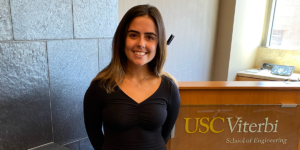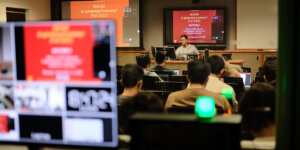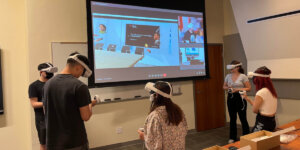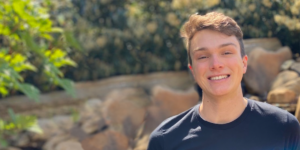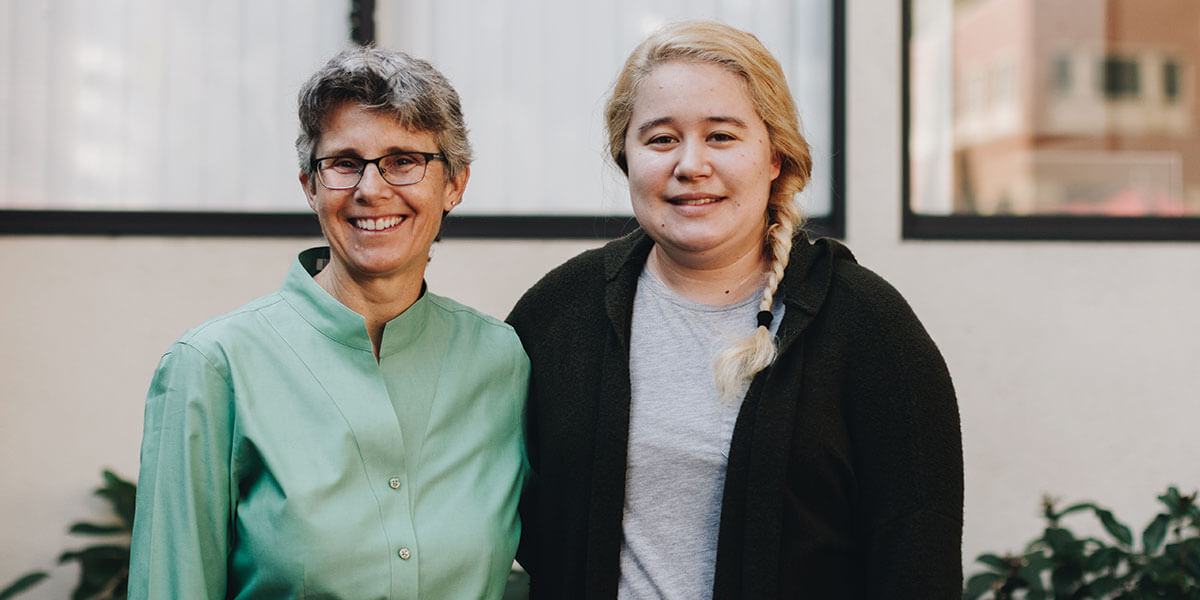
Martha Townsend and Rachel Longjohn of the recently launched “Viterbi Conversations in Ethics,” an online magazine that examines the intersection of engineering and ethics (Photo/Kayly Luong)
Engineering’s power, pervasiveness, and reach now touch nearly every aspect of our lives.
From Amazon to Apple to Tesla to Twitter, engineering-centric businesses have changed the world by spawning social media platforms, lifesaving bioengineered medicines, iPhones and self-driving cars. The inexorable march of technology, fueled in large part by graduates of USC Viterbi and other blue-chip schools of engineering, promises to reinvent society in unforeseen and unpredictable ways. The only constant: change is coming and faster than ever.
That’s why it’s imperative that engineering students receive a strong ethical foundation to give them a framework to make decisions to benefit the greatest number of people, even at the cost of short-term profits. As such, USC Viterbi’s Engineering Writing Program (EWP) has long made the examination of ethics the centerpiece of Writing 340, its advanced writing course for students.
Consistent with that pedagogical commitment to having students articulate the role ethics plays in their respective disciplines, EWP professors have collaborated with USC students to create “Viterbi Conversations in Ethics.” The new online magazine, which launched in early November, is believed to be the first student-written and student-edited engineering ethics publication in the country, said Martha Townsend, the periodical’s faculty adviser, an EWP instructor, and creator of the magazine.
“We hope that this magazine inspires students, both at USC and elsewhere, to think more deeply about ethical issues and what it means to be an ethical engineer,” she said.
Added EWP Director Steve Bucher: “The magazine is framed as a conversation, which is appropriate and reflective of the challenge students face when trying to understand how ethics apply in a fast-changing world. We’re not necessarily telling them we have the answers, but writing the magazine article has them engage with the ethical questions important to them.”
Townsend said that she thinks the articles featured on the online publication could inspire Writing 340 students, who must write their own ethics papers in the course.
Viterbi Conversations in Ethics comes out twice a year, in the fall and spring semesters. The magazine features five to seven topical articles by USC students that examine the intersection of ethics and engineering. A team of student editors choose the best pieces among the roughly 125 papers submitted every semester by Writing 340 students. The inaugural issue includes works about the ethics of deep sea mining; the debate over dams; and genetic engineering in farmed animals.
Future editions will likely include a discussion board that would allow students to exchange ethical ideas and possibly podcasts. Additionally, a new section might feature magazine and newspaper articles that stimulate ethical discussions and could serve as case studies, said Rachel Longjohn, “Viterbi Conversations in Ethics” editor.
“Engineers’ work affects everyone, and I think it’s important that they and others have an ethical framework before making impactful decisions,” said Longjohn, a 21-year-old senior majoring in applied math with a minor in applied analytics.
The “simple design” of “Viterbi Conversations in Ethics” resembles that of “Illumin,” the EWP-produced online magazine that explores the science and technology behind everyday items, said Tuling Zhao, web developer of Viterbi Conversations in Ethics and a senior with a joint major in computer science and business administration. Like Illumin, the new ethics magazine features the work of USC Viterbi and other students.
Viterbi Conversations in Ethics had a long gestation period. The online magazine was slated to go live about a year-and-a-half ago, but a hacker (an unethical one, at that) attacked the beta site, forcing Townsend, the student adviser, and her team to start from scratch.
Looking at the first issue of Viterbi Conversations in Ethics from her work computer, Townsend flashed a smile.
“I think this new website shows both USC Viterbi’s and the Engineering Writing Program’s commitment to the full development of our students,” she said. “I think if people from outside of Viterbi read these articles, they will find our students’ thinking and writing impressive. I’m so excited to share this with the world.”
Published on March 13th, 2019
Last updated on March 13th, 2019




